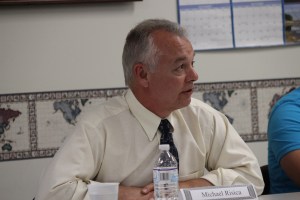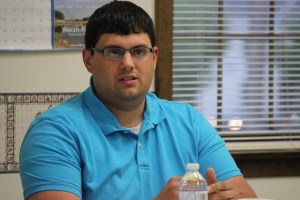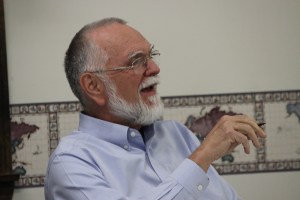PARIS — Candidates for selectmen outlined their vision for the town’s future while dealing with nitty-gritty policy questions at a question-and-answer forum Monday evening.
In the run-up to local elections on June 9, each of the four candidates gave voters a sketch of their views and how they would handle the pressing issues.
Vying for a three-year term on the board, Zachary Creps, a firefighter in Paris and Oxford running for public office for the first time, told the 25 members of the public that he wanted to bring business into the town to bring tax increases to a halt.
Michael Risica, who’s running against Creps for a three-year seat, is a member of the Planning Board who has previously run for selectmen. Risica said he was a “normal guy” who “gets up and goes to work every morning.”
Seeking to distance himself from his rival, Risica worried aloud whether Creps’ position as firefighter could create a conflict of interest if it came to an important vote about the Fire Department.
Asked by moderator Sarah Glynn how the town can improve its image, he replied, “The best way I can say it is to follow all the rules, not pick and choose what we follow.”
Running for a two-year term after Chairman Ryan Lorrain resigned, Victor Hodgkins and Robert Kirchherr said their backgrounds would lead to future success.
Hodgkins, a former school board member and longtime chairman of the town Budget Committee, told the audience he was running because he had raised his children and lived in the town for years. He said seeking the office is a natural step, saying, “I want to give back to my community . . . I really want to do good.”
Kirchherr is a former chairman of the Planning Board and Board of Selectmen. He told the audience he became an effective administrator while dean at Central Maine Community College where he oversaw a staff of 150 and a multimillion-dollar building project.
“We’ve all worked hard to be here . . . We have differences and similarities (but) we share more than we don’t share,” Kirchherr said.
Hodgkins said all of the town’s challenges revolve around job creation. To compensate for a manufacturing force that once supported robust services, but which have proven expensive, he said the town should consider business-friendly policies such as tax credits.
On business, each candidate hammered home their desire to expand manufacturing, the tax base and relieve property taxes. Risica favored merging the area’s services if it made fiscal sense, while the other candidates only said that was a good option if all others failed.
Kirchherr said the key to attracting businesses is upgrading and expanding infrastructure such as roads and high-speed Internet. Hodgkins said the town needs to sell the Mildred Fox School to a business looking to create housing or bring jobs to expand the tax base.
On providing more opportunities for senior citizens, Risica suggested a social center. Kirchherr proposed using the school to host those events, while Creps said the town should look into bringing a program for home medical checkups to seniors.
Asked how to find a good way to fund local schools, Creps said the local administration was top-heavy and advocated eliminating principal positions. Risica echoed those comments, noting another effort to confront school officials on waste was necessary.
Kirchherr sympathized with frustration over costs, but noted most were beyond the town’s control, built into the funding-structure of the consolidated school district. Hodgkins said the cost to fund the school system is high and the state needed to fulfill its payment obligations. At the same time, any one town that seeks relief “robs Peter to pay Paul.”




Comments are no longer available on this story